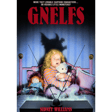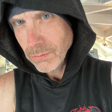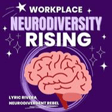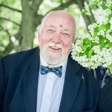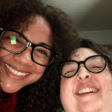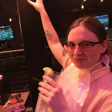Become a Creator today!Start creating today - Share your story with the world!
Start for free
00:00:00
00:00:01

Guest: Sci-Fi and Romance Novelist Lisa Nichols
Best known by the public as the author of Vessel, Lisa Nichols lives with anxiety, PTSD, and occasional writer's block. Lisa explains how she parlayed a passion for Sherlock fanfic into an agent and a major publishing deal. We talk 1970's diet fads, what it means to be queer, the language of romance lit, and why Book 3 of the Savior Trilogy still isn't written. Also, a MadLib.
Beware of mild technical problems. We know. We're working on it.
Transcript
Introduction to the Mentally Oddcast
00:00:03
Speaker
You are listening to The Mentally Oddcast, brought to you by Sometimes Hilarious Horror. My name is Wednesday Lee Friday, and every week I will be talking with artists, musicians, writers, filmmakers, and other creatives, and we'll be discussing how mental illness, neurodivergence, addiction, and the impact of trauma impacts and informs their art.
00:00:28
Speaker
If there's one point we want to make here, it is that you are not alone and you can make art about it.
Meet Lisa A. Nichols: Storytelling and Crushes
00:00:36
Speaker
Art helps.
00:00:45
Speaker
this week. We are speaking with Lisa A. Nichols. She is a writer and in fact she's been a storyteller her entire life. Well the first movie that she totally fell in love with was Star Wars like a lot of people our age. Her first books were the Little House books and
00:01:02
Speaker
Given that, it's really inevitable that she'd wind up writing science fiction with a domestic twist. Lisa lives in Michigan. She's got a tiny dog, too many cats, and one of those crushes on Luke Skywalker that should have, well, she feels she should have outgrown it ages ago. But I mean, come on. We all follow Mark Hamill on Twitter. We know what's up. He's awesome. He's kind of impossible not to love.
Technical Challenges and Personal Connections
00:01:26
Speaker
Hello. Thank you so much for being here, Lisa. It's great to have you.
00:01:31
Speaker
Yeah, thank you for inviting me. Yeah, we're we're actually doing sort of a half ass rerecord because our first session had some tech problems. And as I was kind of telling you before,
00:01:45
Speaker
I do have a degree in broadcasting, but I learned on like nothing was digital when I learned how to do it cutting tape with like razor blades. My alma mater, I went to Olivette college, which is called a university now for some reason, but they actually got the internet the summer after I graduated. So that's how old I am.
00:02:09
Speaker
Well, I mean, and in my case, I'm a tech geek. And I mean, tech is my thing. And so for us to have difficult difficulties, it's like embarrassing. Like, what am I doing wrong? I'm like a Facebook grandma over here. What's going on? I know, right? Let me just invite my grandson to come over and program my VCR for me. Oh, wait.
00:02:35
Speaker
Oh wait, I don't have any kids. I don't have a grandson, but yeah. So actually, one thing I would like to start out by just acknowledging that I owe you a tremendous debt because you are the reason that my husband, we'll call him H, moved to Michigan from Philly, where he's from, and that in turn allowed me to find him and then, you know, make the rest of my life about it. So thanks, that worked out really well for me.
00:03:04
Speaker
I'm glad that worked out. I really do owe both of you an apology though because it took a lot of therapy in a lot of years, but I was the crazy ex-girlfriend in that situation and I did not behave very well and I'm better now.
00:03:23
Speaker
Well, you know, nothing takes it out of you like love, man. We all do our I mean, I guess fear is also kind of there. But yeah, those really are the two things that when someone is being not their best self, usually they're frightened or they're in love. One of the two things. So yeah, I get it.
ADHD Diagnosis and Awareness in Women
00:03:45
Speaker
Is anybody their best self in their 20s? I don't know, maybe. I've heard that like, you know how some people, their childhood like puts their feet on a path to success? I know about that like anecdotally, but most of the people that I know had a childhood that needed to be overcome in our 20s was the time that we did that because it was really our first opportunity. That sounds fake. I don't think that's the thing that happens.
00:04:14
Speaker
Let's just get into you. What is your diagnosis? What are you dealing with? I have a collection. Depression, anxiety, CPTSD, ADHD. I think that's everything. Now, were you diagnosed with ADHD in childhood?
00:04:37
Speaker
No, I was not. I was actually diagnosed in like 2017, 2018. So I would have been 45. I've talked to a few other people that have had that, like girls in particular were not diagnosed because if you could sit in your chair and be quiet, no one was really interested whether there was anything going on. You were just daydreaming or spacey or whatever, yeah.
00:05:07
Speaker
It was, it was interesting because I came to the realization, I actually went to my psychiatrist and said, Hey, I think I have ADHD. And I told her why. And she asked me some questions. And this seems unheard of. She basically handed me an Adderall prescription and said, here, see if this helps. Oh, it did.
00:05:25
Speaker
Yeah, I've never heard of that happening with anybody, but I had found this article in the Atlantic that was like, what it's like to be a woman with ADHD. And this woman was describing my life.
00:05:40
Speaker
like did really did really well all through school and then hit college it just went off the rails because nobody was there like making me do my homework and giving me structure and everything else um so yeah it it was it was kind of a big deal to get diagnosed just because it did make such a difference it going on Adderall was like
00:06:07
Speaker
before I would walk into the kitchen and go, oh, I should make some lunch and then wander off and do something else for three hours.
Mental Health Misconceptions and Empathy
00:06:16
Speaker
Whereas on Adderall, it was like, I should go make some lunch. And like before I could think about it, I was in the middle of making lunch. Like, wait a minute, is this how this works for everybody? That's amazing.
00:06:29
Speaker
Wow. Yeah, I could certainly relate to that. I actually found it very validating to finally get that particular diagnosis because I wanted to kind of go back to all those teachers and say, see, I'm not just lazy. See, I'm not. I am trying. I am doing my best. I don't need to apply myself for that wasn't the issue. And yeah. Yeah.
00:06:52
Speaker
Which, I mean, it's a tough line because we have this thing in our society where we treat people as if everyone is the same, everyone has the same abilities, everyone has the same thought processes. And then when you explain to someone, no, there's an illness happening. People say, oh, wow, I should be nice and understanding because of that.
Impact of Religious Trauma on Childhood
00:07:15
Speaker
No, Dick, you should always be nice and understanding. And by the way, you should do yoga.
00:07:22
Speaker
Oh yeah. Well, brisk walk, man. Is there anything a brisk walk won't cure? I can think of a few things. Yeah, most things. So you deal with depression and you mentioned PTSD. We don't have to go into how that came about. But if you want to, because I think with PTSD,
00:07:49
Speaker
Well, but I think how it came about, how you came to have PTSD can play a major role in how you deal with it, how you manage to treat it. Oh, yeah, definitely. In my case, I don't think CPTSD is actually in the DSM yet, but
00:08:11
Speaker
Everyone thinks that PTSD is like this one big thing that happens. Like you were at war or, you know, whatever. You saw somebody get killed, you know, stuff like that. In my case, it was a lot of little things that piled up. My mom, as much as she loved me, and I know she did, was not a good fit for me emotionally.
00:08:38
Speaker
I think her nightmare was to have a fat kid, because she had a fat kid. And there I was, a fat kid. So I got the message a lot that I wasn't good enough. And I got the message at the church we were going to, which is super conservative and super restrictive, that also I wasn't good enough. And not only was I not good enough, I was going to go to hell.
00:09:07
Speaker
if I could just interject, which I will. But people don't always appreciate how damaging it is to tell children, hey, if you don't do everything on this list and avoid everything on this other list, some of which are straight up impossible to do, that
00:09:27
Speaker
after you die, you're gonna burn in a fiery pit until the end of time. Like how do people not see like, oh, maybe that's not good for children to tell them that, especially when they're it's like perfectly normal things for girls. Like I was told by a minister that if I didn't cross my legs, it was an invitation. And believe me what I tell you, I was way too young to know what it was an invitation to.
00:09:53
Speaker
And looking back on it, the fact that a minister would say that to a girl of like, I mean, I didn't even have boobs yet. So I was like nine. You know, I started showing in like, in like third grade. So, I mean, that's terrifying. And of course that causes trauma and people want to kind of laugh that off. Like, oh, somebody told you something scary as a kid. Well, no.
00:10:16
Speaker
I mean, saying that your soul is doomed, like, you know religion impacts people because otherwise you wouldn't shove it on them, not you you, but the general you.
00:10:26
Speaker
Yes. I think what causes trauma has a lot to do with individual personalities as well. Um, you know, if I was already prone to anxiety, which I was, you know, being told, being told that like four or five years old, that someday, someday soon you're going to hear a trumpet and then Jesus is going to come down out of the sky. And, and then all the dead people are going to come up out of their graves. It'll be great.
00:10:54
Speaker
My first Romero movie, maybe age 10, so I already knew that people coming up out of the ground wasn't great. I hadn't seen any Romero, but I was just like, no, I don't want dead people to come back.
Body Image and Toxic Diet Culture
00:11:06
Speaker
I can remember looking up at the sky regularly going, is it going to happen? Is it going to happen now? When you pile onto that, you know, like the rapture or whatever, but then like nuclear war,
00:11:18
Speaker
And they made that movie the day after that basically scared a lot of everyone because they wanted to impress upon everyone that nuclear war was bad. Like we needed that. Oh, is it? Will it be bad? Like we already had. We know what Hiroshima was. So we already know it's bad. But somehow they just got to drill that in.
00:11:40
Speaker
I really think the threat of nuclear war was a massive source of trauma for everybody our age because the 80s especially, I don't know about you, but I didn't think I would live to grow up because something was new. My retirement plan was dying before I was 40. I had no idea I'd still be here at this point.
00:12:00
Speaker
I just expected that, you know, there'd be a nuclear holocaust and I probably wouldn't be one of the ones to survive. So yay. Well, and you know, as a fat chick, everybody's perfectly happy to tell you that you're going to die really young and it's going to be awful. Plus you'll be alone because no one will love you. Like, you know, that's especially when they say, well, you know, no one would say that to you if you would just lose the weight as if, I mean,
00:12:27
Speaker
I'm here to tell you, it's not always a choice. I had apnea since birth, and it was treated when I was 37. So my weight was a dozen years before anybody knew like what was causing it. Well, and for me, that was another thing. I never got a good night's sleep. So I was always tired, which exacerbated things like ADHD and depression and you know,
00:12:51
Speaker
Part of my trauma actually comes from dieting. I can remember the first diet my mom put me on. I was maybe five years old and this was like the 70s. So she brought home this blue and white mimeographed photo sheet of the diet I was supposed to follow.
00:13:15
Speaker
And it was things like, I mean, it was basically the Scarsdale diet. It was things like breakfast should be half a grapefruit and a piece of dry toast and black coffee. And I can remember looking at her and going, mom, do I have to drink the coffee? She said, no, no, you don't have to do that. And like in hindsight, that was so fucked up. It was just.
00:13:38
Speaker
wow, that really piled into the whole message that I was not enough, that who I was was not acceptable. Yeah, I mean, when you walk around with that in your head all the time, like I was a teenager when I realized that everyone didn't have a voice in their head that was like yelling at them and telling them they suck. Like I thought that was just a universal thing that everyone had. And
00:14:03
Speaker
So I would start to tell a friend, like, oh no, you don't suck. And they're like, oh, I know. I know I don't suck. Like, wait, you do? How did you find that out? I think I was older than that. Like, your mom gave you self-esteem? Well, that's bullshit. Why didn't what? I want your mom. This isn't fair. So.
00:14:26
Speaker
And that's the thing, when you start to realize that all families aren't your family and all your family's dysfunctions are not, I thought everybody had a Weight Watcher chart on the fridge and they had to go check off the stuff that they ate so they'd know when they weren't allowed to have any more food that day. Because the thing is, the standard Weight Watchers plan, the actual food that you're supposed to eat,
00:14:48
Speaker
it's not it's not bad it is a reasonable like sure you should probably have about this many carbs in a day you should have about this much protein about this much fruit and veg like all of that makes sense
00:15:00
Speaker
It's the fucking moralizing of it. Like they call foods legal and illegal. Like that's how they refer to foods. And like the word sinful. Like when is the last time you heard the word sinful applied to something that wasn't food? Most likely a dessert. Like, oh, it's sinful. You should feel bad about yourself for enjoying ice cream. No, man. It's a sometime food. Don't gorge out on it. But if you want some frigging ice cream, have a little.
00:15:27
Speaker
Skipping a Sunday is not going to make you thin anymore than having a Sunday is going to turn a thin person into a fat person. It's not how it works. Yeah. Well, you know, speaking of Weight Watchers, that was probably the thing that I was on for the longest. And I can remember, I've written about this before.
00:15:47
Speaker
I don't know how old I was. I was maybe eight and it was after dinner and I had eaten everything I could eat for the day, you know, checked off all my things and I was hungry. And what I wanted more than anything in the world was an apple. I had like this moral crisis. Like, no, I can't, I can't eat the apple. I've had all my fruit. I can't, I can't eat it. And like, seriously,
00:16:17
Speaker
God was gonna be mad at me if I ate an apple. Which, I mean, to be fair, to be fair, that has some historical basis, but...
00:16:30
Speaker
Maybe you could share it with someone. Oh, that's no good. Right. No, that's no good either. But to this today, looking at that back, it's like it was an apple. It was like maybe 60, 70 calories or whatever. And I'm horrified that I still remember that. Yeah.
Queer Identity and Modern Dating Dynamics
00:16:48
Speaker
I mean, those are your formative years. So you are setting yourself up when not setting yourself, your parents or whatever they're setting you up or how you're going to relate to food forever.
00:16:59
Speaker
forever. Yeah. I mean, we've all been out to lunch with adult women that I mean, the moralizing that goes on. If you want to fry, please have it. You know, what's interesting though, is later on,
00:17:14
Speaker
I ended up in a rehab program for dual diagnosis people because I was smoking weed and people didn't like that. And what's interesting is the language that addicts use is very similar to that kind of toxic diet language that people use. There are actually diet plans that do the same kind of replace it with Jesus mentality that a lot of addiction programs use.
00:17:40
Speaker
Cause it's all about, you know, self punishment and feeling bad about yourself. And you'd think that we as a society would know by now that making people feel bad about themselves all the time. It there's, it's not good results. People aren't motivated by that. And if they are motivated.
00:17:57
Speaker
It's out of like anger and spite and stuff. It's not, it's just not healthy all around, you know? Cause especially when you've got a child of like five, you know, there's no reason to restrict a child to that level. Like give them healthy foods, encourage movement that is joyful and not punishing. That's kind of it moving on to another topic. I'm aware that you identify as queer. Um, yeah. Is that, is that the same as being gay?
00:18:28
Speaker
But for me, and apparently this is a slightly controversial opinion with some of the youth, but for me queer is a really useful umbrella term. Like it encompasses LGBTQ, asexual, anything that's outside of straight, right? I mean, obviously I have dated men because, you know, your husband.
00:18:59
Speaker
I've dated women and at this point I don't want to date anybody. I'm done. Talking about queerness. Now I actually heard that like in general I heard it first because one of my favorite actors is he uses that term to describe himself. Cory Michael Smith by the way he was the Riddler on Gotham. Oh my god I love him so much. Oh yeah.
00:19:23
Speaker
And he identifies as queer. And I was like, oh, no, he's gay. And then I had heard that, no, that's not what that means. And that I should look things up instead of assuming. Because I know when I was a kid, the term queer was used like sort of like a slur. Like, I don't know if it was actually like it was often said unkindly to describe gay people. Right. And I was never exactly sure on the term itself.
00:19:51
Speaker
Well, I mean, for me, I don't consider it a slur if nothing else, because there are academic programs at colleges called queer studies. Okay. I mean, that's what the that's what the area is called. For me, it's a really useful umbrella term. Like,
00:20:09
Speaker
I can say that I'm queer and I don't have to spell out that, you know, I'm gay or bi or pansexual or gender fluid or any of those things. It's just I'm not straight and I'm not and I'm maybe not be cis. I happen to be. But I mean, as you know, I've dated men because I dated your husband.
00:20:32
Speaker
And I've dated women and I've fallen in love with both. Right now, I am not interested in dating anybody. I don't know if I call myself asexual or just tired. Well, you know, sex toys are better now than they've ever been. So it's a great time to not be dating anyone.
00:20:55
Speaker
I'm just saying there's a lot of hassle to deal with people. People are a lot. For most of the time that I was with my husband, I thought, my God, I'm so glad I'm not dating. I'm so glad, I'm so glad, I'm so glad. I feel a little differently about that now. I'm not going to go into like major specifics, but I spent some time on national medicine for work. Like legitimately, it's for my day job. But yeah, just like
00:21:25
Speaker
Suddenly like because there was no internet dating when when h and I met well, we did actually meet like on the internet But there were not like dating apps that had chat functions and you could swap pictures easily And you know stuff like that wasn't really going on
Online Dating Culture and Self-Respect
00:21:42
Speaker
yet. I missed all of it So when I got back into it, I was like, this is a riot Plus I have self-esteem now, but I didn't have that last time I was there
00:21:52
Speaker
That's the big one right there. Yeah, because I am so much more cavalier being like, nope, unacceptable. Nope. You're a dick. Nope. All you want to talk about is sex. That's not cool. My eyes are up here, et cetera. Yeah, yeah. And it's just wild, like how much different
00:22:17
Speaker
I mean, men are very much the same, but the trappings of it. I don't know, you're almost my age, so you probably remember when flashing was a thing.
00:22:29
Speaker
And it was like you had this mental picture of a guy in a trench coat who just was a crazy sick pervert because he wanted to show his penis to random women. And I think we all know that there are a great many men. Well, I don't know if you saw my my Ashley Madison article. I wrote it for Kinkley. And one of the things I mentioned was like three weeks on Ashley Madison. I saw more pain than like my entire dating career.
00:22:58
Speaker
I had a really good dating
Transition from Fanfiction to Professional Writing
00:23:00
Speaker
career. It just, my God, everyone wants you to, not only do they all want you to see their penis like it's their best feature, which is already a red flag, but like a lot of these fellas, sorry man, it's nothing I'd write home about. I have a saved photo that I have been known to send back.
00:23:18
Speaker
when I've gotten one of those unsolicited, which thankfully doesn't happen much these days. Apparently, one of the hot dog companies made up an easy tool for cutting hot dogs up into little pieces. And there is a picture of how it works. Yeah, so I kept that and I would send that back. Funny, I never heard from them after that. Aw, poor little fellers.
00:23:47
Speaker
Um, right. So I really want to get into your literary career because you wrote a sci-fi book and it was picked up by a major publisher. I've never been picked up by a major publisher. What's that like?
00:24:01
Speaker
Well, so the three books that I published, the first two were through an imprint of Penguin, the two romance novels. And Vessel was actually a really different animal. So the experience was really different. It was work for hire, which means that the company that owned the story essentially put out, this is the story we want and sent it to various different agents and stuff like that.
00:24:31
Speaker
It just so happened my agent said, hey, these guys are looking for a writer. Here's the book they want. I thought you might be interested in it. So I ended up writing like four or five pages of just a scene that I made up between the characters. And they liked it well enough that they hired me to be the writer. And it was one of the most bizarre and exciting experiences of my life.
00:24:59
Speaker
The company in question, I'm not going to name, but their whole thing is that they come up with stories, find writers to write the stories. The books often become a series, and then the book series often become a TV show or a movie.
00:25:22
Speaker
you've heard of some of the shows that they're behind. And so they approached me with this concept of, okay, we want you to write this. We want it to be a series and hopefully we'll be able to sell it and make a TV series out of it. And so that was really exciting. They flew me to New York for a whole day and I spent it in their offices with some of their staff just fleshing out the story. We kind of wrote a brief outline. Most of the ideas were mine, like they were just kind of driving behind it.
00:25:50
Speaker
And I feel very much like the story is mine because I came up with they're like, we want something that will do this. And I will come up with how we got to that.
00:26:01
Speaker
Wow. That kind of writing is what I as a child envisioned writing to be, that someone would find you and say, hey, here's a story we want. Do you want to write it? And then they pay me to write it. Like that's what I thought writing was about. And when I found out that I had to find my own agent and I had to like pitch my own stuff, it
00:26:23
Speaker
just seemed so like terrifying that I didn't even know how to make a move. And that's, I mean, I was 34 when I started writing my first book that ended up getting published. So well, I guess I started another one before then. That sounds like, you know, the dream where someone taps you to write something. Well, the only downside of it is that I don't own any of it.
00:26:50
Speaker
I have, I don't own any of it. I've been paid. My part of that is done. The terms, I don't know how much we want to talk about money, but the terms were I got 30% of whatever the company got.
00:27:07
Speaker
I mean, granted that was more money than I ever thought I'd get for writing a book, but the other thing people don't tell you is that when you get a book advance, they don't just send you a check for the whole amount.
00:27:23
Speaker
Mine was broken up into four pieces and they would send the check to my agent. She would take her well-earned 15% and then send the rest on to me. And broken up into four pieces, it really wasn't a ton of money and that was stretched out over two years. So the idea that you get a book advance and it will fix everything is usually not true. In fact,
00:27:51
Speaker
The first two books that I wrote, The Farther I Fall and As Lost as I Get, my combined advance for both of those was $4,000. Oh, wow. Yeah, I've only ever been offered an advance once, but I ended up not taking it because
00:28:10
Speaker
the publisher wanted changes that I wasn't willing to make. I actually didn't know what to do at the time. I was like, what? I have a chance in advance, but then also this isn't going to be the book that I want it to be. And I actually... Exactly.
00:28:27
Speaker
fortunate in that I went to undergrad with an author who's been on the New York Times bestseller list. Now he's the guy who invented the podcast novel.
Creative Control and Publishing Challenges
00:28:37
Speaker
Yeah. I don't know if you know if I should say, well, I just said he's the guy who invented the podcast novel. So a lot of people know that that's Scott Sigler. So I'll just say it's Scott Sigler. Okay.
00:28:47
Speaker
And I contacted him and I was like, dude, this is what happened. I don't know what to do. And he's like, well, it sounds like you do know what to do, because if you're that worried that they're changing your book this much, this isn't something that you're going to feel good about later. And he was totally right. And I ended up taking that book to a different publisher who had also published some of my literary heroes. So I actually, I got to be in an anthology with Jack Ketchum.
00:29:17
Speaker
because I picked a different publisher. I know, right? That's amazing. Yeah, that was the other big downside of writing Vessel, and I feel like I'm spilling all the secrets here, but I didn't name the company. There were certain storyline decisions that they insisted should be in the book that I did not want to put in the book. I didn't pick the title. I was given a chance to approve it, which I did reluctantly, because the title gives the entire twist of the story away.
00:29:47
Speaker
Oh, yeah. Once you start reading it, it's really clear what the title means. And I was not thrilled to get that feedback from reviewers like, Oh, this was really predictable. It wouldn't have been without the title. The other issue is it was marketed. It was marketed as a comparison with the Martian.
00:30:08
Speaker
because the similar premise of person alone in outer space trying to survive and trying to get back home. But any similarities ended right there because the Martian is about as hard sci-fi as you can possibly get. It's brilliant. It's funny. He does it really well. I do not write hard sci-fi.
00:30:30
Speaker
I write hand-waivium, sci-fi. You made me cry. I do, I do. I did do research. Well, people love to tell you when you're wrong. You have written these romance books. Like, I don't read a lot of romance, so it's not something that I know a ton about.
00:30:56
Speaker
But one of the things that fans of romance novels tell me about is the wide variance of female leads, that it's not all damsels in distress. It's not boss babes. It's not like there's a lot of different kinds. I want to know about your female leads. What can you tell me about them? Well, one thing to know, and this isn't just true of the romance, I've realized every single female lead character that I've written has PTSD.
00:31:24
Speaker
I didn't set out to do it that way.
Influence of Fanfiction on Romance Writing
00:31:28
Speaker
But what I wrote was a subgenre of romance called romantic suspense. And I should preface this, this ties into the fanfic discussion. The first book that I wrote was actually based on a novel length fanfic that I wrote for the Sherlock fandom.
00:31:47
Speaker
I wrote what's called an alternate universe, so it has the characters, the characters act roughly like the characters would act according to the writer's opinion, but it's in a different setting. But the thing that I really love about romance is people talk about how it's predictable. You always know that it's going to be a happy ending. Well, yes, but the tension comes from how you get them there.
00:32:12
Speaker
That's where the twists come in. That's where you don't know what's going to happen and all of that. The second heroine, she was with a group vaguely based on Doctors Without Borders working. She was Afro-Latina, which I regret doing now because I think I did it really wrong. But I did my best and I had people reading it for me. But she was working on a mission in Columbia.
00:32:40
Speaker
to basically provide healthcare there in the remote areas. And there's all kinds of political shit that goes on. And like I said, lots of guns, a few explosions, a lot of sex. But it was just genuinely a lot of fun to write. And I am a romance reader. Right now, I have to put in a plug. This is so different from what I wrote, but Courtney Milan is just utterly brilliant. She writes the funniest
00:33:09
Speaker
romance novels that can still make you cry. And it's just, it's, she's very enjoyable. I actually got my roommate who has been diehard. Romance is dumb. I actually got her hooked on reading Courtney Milan. Wow. I was just like, no, just try one. Just try one. You're gonna like it. And she did. Yay. So yeah, I, what impressed me the most is it isn't
00:33:38
Speaker
I can't tell you the number of articles that still get written about the bodice rippers from the 70s and 80s, sword and the velvet sheath and all of that nonsense. Yeah, that's actually one of the things that put me off of it, certainly, was the language that people use in romance novels, just the ones I've encountered to write sex, it's enough to make it like, I cannot write a vanilla sex scene that is compelling.
00:34:06
Speaker
If no one dies at the end, I don't know what the hell I'm doing then.
00:34:12
Speaker
And I've tried cause you know, I might, my day job is in the sex industry. So I have absolutely tried to write compelling vanilla or even BDSM scenes. I'm just not good at it because all of the language to my ear sounds either clinical or ridiculous. Like I can't find a medium where I can talk about a penis and just have it be hot and not ludicrous and not
00:34:39
Speaker
I don't know. I don't have it in me for whatever reason. Not penises. I've had penises in me, but the writing part.
00:34:58
Speaker
The language that gets used in a lot of contemporary romance with what they call high heat levels, as in like, you don't close the bedroom door you go with them and you get detail. Okay. The vernacular is
00:35:13
Speaker
very much in use. Like authors have different favorite words that they could use, whether for some people it's dick, some people it's cock, just using the actual words that people use and not trying to disguise it or pretty it up or whatever. And what I found for me is that can be a really interesting way to
00:35:38
Speaker
explore character, you know, by how you react in those moments and how characters react to each other. You can do some really interesting things with it. Oh, yeah, I would think so. Like, especially in first person. How, you know, because most of my stuff is first person. That's why my first novel is like my my first novel is an absolute Mary Sue in the first person about a person very much like me murdering someone very much like my tormentor. Well, my mom.
00:36:08
Speaker
I'll just say it because it's published, people know. I wonder how common that is because I can't imagine that Stephen King is looking back on Kerry and saying, yeah, that book sucked. I don't know what I was thinking. That's not a thing.
00:36:25
Speaker
The secret is really is that wasn't my first book for one thing. Like I've written probably eight or nine novels at this point.
Writing Themes Influenced by Personal Trauma
00:36:34
Speaker
Most of them are shit and we'll never see the light of day. But I learned a lot from them that it was practice, I guess you could say. My second novel is the one that I'm the most embarrassed of because basically I wanted to write something that was
00:36:53
Speaker
not about me, just to make sure that I could. And I wrote third person perspective, which I'm not great at. So my second book is the one that I hope never sees the light of day again. It's actually not right now.
00:37:09
Speaker
Well, you know, speaking of Stephen King, he actually pulled, I guess I wouldn't say he pulled it, but you know, Rage, the story Rage, which is one of the Bachman stories, is no longer in rage. Oh, yeah. Yeah, that's because that's, it happens too often now. Well, and because I guess several school shooters were found with the story in their possession. So, I mean, yeah, like I get it. I get where he's coming from.
00:37:38
Speaker
But from my perspective, when I read Rage in high school as a very angry, bullied person in a bad home situation, I had never felt so seen by a book as that book. And that was even reading as a chick. I still was like, wow, yeah, I totally get all those feelings. But that's, I guess, the thing that as a woman, it didn't inspire me to get a gun and try that out. But I think boys respond to things like that.
00:38:08
Speaker
a little differently. Yay. Testosterone. Well, and it isn't really testosterone. It's the sense of entitlement and also the sense of like, well, if you weren't doing anything about it, then you probably don't care very much that spurs action in situations where thought would probably be more productive.
00:38:31
Speaker
Because, you know, in Michigan, we have the Klan that would come through town all the time. And I spent years and years saying it's very important that we allow these people to have their parades. It's important that we be quiet and let them say their thing because everybody has the right to be heard.
00:38:49
Speaker
And I very much believe that when I said it as a kid and in my 20s and in my 30s.
Views on Free Speech and Societal Responsibilities
00:38:55
Speaker
And then there reached a point where I was like, no, you know what? Fuck that. They're here to hurt people. They're here to be dicks and assholes. And we've heard you. You aren't saying anything new. There have not been any big breakthroughs in racism that we all need to know about. It's all the same.
00:39:13
Speaker
Hurtful, hateful shit, and no. Yeah, you can say it, but no one is required to be your audience. No one is required to be respectful to you. I'm not down with the rock throwing and stuff. I think physical violence shouldn't happen unless it's in response to physical violence, but I'm saying that for me. I'm not saying that for everyone.
00:39:34
Speaker
Somebody is beating the hell out of a Nazi for some reason. I cannot envision a situation where I would feel compelled to intervene. We actually touch though on fanfic and I want to talk more about that because I, for example, I've always been super negative about fanfic. I have described it using the phrase literary masturbation.
00:39:56
Speaker
which some people have taken exception to. And I had a very smug, like, well, if you can't come up with your own characters that you can't do, you know, you're not doing the work, you're cheating, that's cheating. And you were one of the people that actually said to me, bitch, you don't know what the hell you're talking about. You don't read fanfic, you don't know what's going on here. And that was true. I mean, most of the fanfic I had been familiar with was
00:40:27
Speaker
I mean, it was mostly like Harry Potter characters having sex with each other was the fanfic that people were sending me. Like, oh, read this fanfic. It's so great. Like, no, I don't want to know that Hermione wants to sleep with Snape. That's awful. Stop saying it. Even back before we knew about Rowling all the way. But fanfic is a whole lot more than that. What would you tell people about fanfic if they're, if they hate it?
00:40:53
Speaker
Like if they say they hate it and don't read it for that reason, what would you want people to know? The biggest part about fanfic for me was the community. When you write normally you write by yourself and you edit by yourself and it takes a long time before you get any feedback if you get any feedback.
00:41:14
Speaker
a writing fanfic, you have an instant community of people who comment and they're enthusiastic. And that's lovely. The story I was telling you about the novel length one last time I saw had something like 50,000 hits. I think it's more than that now. So I was pretty widely read. And so I got a lot of really positive feedback that was just exciting. I started trying to write professionally when I was about 23.
00:41:42
Speaker
and I wrote horrible short stories. I thought the the path was you know you write short stories and get in a magazine and then you work on a novel and get an agent and it goes from there. And I stopped because I mean I sold a couple of stories but I just wasn't
00:42:03
Speaker
I just, I just wasn't, it just didn't feel right. And I stopped, you know, and plus various life circumstances intervened, and I wasn't able to write for a while.
00:42:18
Speaker
I was like, I'm fanfic. And I got an idea for a story that wasn't about who was sleeping with who, which I cannot throw any stones about because God knows, God knows I have written my share and some of it, I don't want to shock people too much, but let's just say I was crushed when Return of the Jedi came out. All of my hopes and dreams were completely destroyed. And now I gotta guess, like, were you bummed about Leia or were you bummed about Han? Oh, wait, no, you're a Skywalker crush.
00:42:47
Speaker
Yeah, so here's the thing. Lucas, people say, well, Lucas knew all along. Lucas didn't know shit. Like he had planned for it to introduce a new, he had planned to introduce a new female character who was Luke's sister in the third movie. And they eventually decided that they just couldn't fit a new female character because God forbid there's more than one.
00:43:08
Speaker
so they're like okay well this is easy we'll just make Leia his twin sister never mind like the kiss in Empire Strikes Back hello or that they look nothing alike and even in Star Wars I went back and I've seen some of the original trailers for the movie like before it came out and it's all like a boy a girl
00:43:31
Speaker
In space, you know, it was very much like this is going to be the couple. I was crushed when Return of the Jedi came out. I was like 11, 12 years old.
00:43:42
Speaker
It's like, but no, it can't be. I mean, I think about all the people in the 70s who had Luke and Leia themed weddings and I am well off topic here. But the thing was, was writing fanfiction got me writing again. It got me excited to write stories again. And having an audience for them was just even better.
00:44:06
Speaker
It is, the term literary masturbation probably isn't too far off, but honestly isn't all writing kind of that. Well, you know what? I'm very prone to masturbation. I want to be clear about that.
00:44:19
Speaker
I just don't think you necessarily need to blog in depth about it. But I mean, people do that. That's the thing is that we talk so much on this show. Like part of our purpose is to show people with, you know, mental illness and trauma and all of those factors, working it through with art. And if you don't have
00:44:45
Speaker
You know, if you're not one of those people that's constantly planning a novel, fanfic would be a great way to get there, to just get your thoughts out through characters that you already know without having to do world building. The process of adapting fanfic into something original, it was fascinating in terms of, I mean, basically they're two different genres of writing.
00:45:10
Speaker
And it was like I wasn't so much adapting it as translating it. There are certain tropes and certain, there's certain emphasis in fanfic that in original works are incredibly dull. There's a lot of, a lot of internalization in fanfic. There's a lot of, you throw in little side references to the show or the movie or whatever that are just there for people to get and be like, aha, I see what you did there.
00:45:36
Speaker
um when you write fanfic you already have an audience that loves these characters that is absolutely something that's easier um but then making that translation i had to figure out how do i make you like these characters i already love them but how do i make you like them um
00:45:54
Speaker
So that was fascinating to me. For me, it was the community. It was getting affirmations that, yes, I was a good writer, that people did want to read my stuff. And that is part of what encouraged me to go ahead and start going back to try to write professionally again. The other thing Fanfic did, and you may or may not know the story, my agent was also a part of the Sherlock fandom.
00:46:20
Speaker
Yeah, I did know this actually. We were in a group chat with other fans and I didn't know her at all, but she was like, oh, oh God, I read your story. It was so great. I really just proceeded to tell me what she liked about it. And I went and clicked on her profile and went, fuck, you're a literary agent. And so I messaged her and I was like, I was like, hi, you're a literary agent.
00:46:47
Speaker
I used to write original stuff and I might want to again and she was like you know please please if you if you write something please send it to me and so I told her I was thinking about adapting the story and she was like absolutely yes and so I spent several months doing that and sent it to her and she was like yes I want to represent you which
00:47:10
Speaker
is not how that usually works.
Challenges in Writing Career and Personal Health
00:47:14
Speaker
I got very, very, very lucky. It's kind of like the equivalent of being discovered in like Woolworths or something. Wow. And I mean, and even further, my first book got accepted by a publisher. That also doesn't happen very often. That is amazing. It really is. So what are you working on now?
00:47:34
Speaker
That is where the mental illness comes in, but 2020 was like seriously a hell of a year for me vessel came out in 2019. And I kind of stalled on writing because it was pretty clear that they weren't going to ask me for book two. And that was depressing. You know, it's like, Oh man, this is the third time I published a book.
00:47:55
Speaker
And nobody gave a shit. I mean, to give you an idea, I still get sales reports for the first two novels. They came out in 2015. The second book just recently, the copy sold went into three digits. Like it just recently reached over a hundred copies sold. Yeah, it tanked. So I was a little depressed and like, oh, I really want to write again, but yeah. And then 2020.
00:48:25
Speaker
I feel like that's all you need to say. And then 2020. But I had the added complication of in January of 2020, I was diagnosed with endometrial cancer. I spent the whole year going through treatment and radiation therapy. I didn't have eukemos, thank God, but had surgery, all of this stuff. And so that was kind of a year of recovery. And then my life upended and I moved in with my best friend who has two teenagers, which is how I now say that I managed to become a parent after a hysterectomy.
00:48:53
Speaker
With all the change, I just stopped writing and now I've tried and I'm stuck. And I think a lot of what it is, I wrote romance, but I'm not a romance writer. Like, I don't have the same passion for the genre that the successful authors really do. And readers, romance readers are savvy and they can smell bullshit.
00:49:18
Speaker
If you are not 100% invested in being a romance writer, I think that's probably why those books didn't do very well. Something was just not there. I liked writing Vessel, but I established that I'm really not good with things that require actual facts.
00:49:38
Speaker
Stupid reality, getting in the way of good pros. Right. So I think in that 2020, we're like, everyone's dying. And I obviously made a full recovery, but there was a moment there when they're doing tests and like, oh, we see something on your lung. And I'm like, fuck, okay. So what do I do now if I have six months to live? And thinking about that seriously changes your worldview a lot.
00:50:05
Speaker
And what I realized is I don't know what I want to write. I don't know what stories I need to tell. And not being able to, not being able to find that is incredibly frustrating. I miss it. Those down times, there are things to learn during those times. They say, I don't know if there is, like when I got a, I left my last day job in 2012. Oh yeah. I didn't write.
00:50:35
Speaker
Creatively because i switch to writing from home for my job so i was doing right you know like the kind of grant writing that you start out without add copy and seo and list goals and.
00:50:46
Speaker
you know, then I started doing reviews and kind of getting a portfolio together, but I didn't write creatively until 2020, except for a couple of short stories here and there. But then I had something I really wanted to say, and it turns out I wished I hadn't have said it, but that aside, I really wanted
00:51:06
Speaker
Well, I mean, you know a book I'm talking about. I really wanted to explain to the world my understanding of Don Jr. and how Don Jr. is not a terrible person. I wanted people to see what I saw, which was that he's an awesome person and he's surrounded by terrible people. He's trapped in an awful situation.
00:51:24
Speaker
And I was so desperate for people to understand what I saw in that and how like, no, no, he's really respectable. His default setting is honest and he's been trained out of it like this whole like thing. And so I wrote, I spent like two years writing that book and then I had it edited and I published it and I started marketing it and I was so excited to like let these ideas out on the world.
00:51:52
Speaker
And two months later, he helped lead a seditious attack on the fucking Capitol. And I felt like- Wow. And I'm like, man, I'm never talking about this guy again. By 2022, I was morose over the whole thing. And it just made me sad all the time. And I just felt bad, bad, bad. And then it turned out, I wasn't really as mad about that as I thought, because my body had started shutting down on me. I got COVID.
00:52:22
Speaker
It turned into long COVID, it knocked my heart out of whack. So like physically I was, I was dying. I was like starting to die and I wasn't eating and my blood sugar kept going down. Like by the time age actually got me to go to the frigging hospital, my blood sugar was 27.
00:52:40
Speaker
And I was like sitting up and talking.
Creative Outlets and Podcast Closing
00:52:42
Speaker
They say 42, if it goes below 42, that can put people into a coma. And I'm just like, yeah, I'm going to the hospital. This is great. Oh, look, firefighters, aren't you guys hot? Wow. And just like, loopy as shit, but absolutely alive and talking. And then that year was the year that I published the second President Sun book.
00:53:06
Speaker
And it's so angry and awful. It is not a good book.
00:53:11
Speaker
And so I'm trying to finish book three. Well, I started writing book three and the president's son was going to fall ass backward into solving Middle East peace. And then some things happened in the world regarding that. And I said, holy shit, there's nothing funny about this. And I had to scrap the whole damn book that I had so far and put out short stories. And speaking of short stories, that's actually what I was bringing up was that if you are feeling like
00:53:40
Speaker
too daunted to write a novel or you don't know what it should be about. Take all those little scraps where you wrote clever ideas on and turn them into short stories, man. It is so satisfying to just put out punchy little, that's what I've been doing for the last couple of years is just these punchy little short stories that are so like, you know, they're short, they're effective.
00:54:01
Speaker
And they are one idea, or maybe two. But, you know, instead of like, before I was writing short stories, I had just pages and pages and pages of ideas for things that I wanted to put into a novel eventually. And after almost dying, eventually,
00:54:20
Speaker
but I don't even know what eventually means. Now, now, now. That's when we're doing things. We're doing things right goddamn now. So that's why I started a podcast. Because I'm like, oh, I have an idea. Instead of thinking about it for a year and then being too lazy to start it, I think I'm just going to do it. And so. That's just crazy talk. Well, I don't want to sound like Nike or anything, but just do it. Do the thing.
00:54:47
Speaker
No, it's almost dying, really does change your perspective a lot. Things that you thought were super important just don't seem to matter that much anymore. It's like, okay. And I wonder if that isn't even more true for people like us who do not have children, because if you have children, you're constantly being reminded of
00:55:10
Speaker
lots of things that I don't really have to think about, like your mortality or the passage of time. You know, people with kids don't say, holy shit, 10 years have passed. What the hell was I doing for that time? Because you've watched your kids like go up in grade levels. You know, you get all those reminders of like time passing and stuff creeping up on you or whatever. And single people, I think, or people with no kids, it's much more optional to be seeing the world in those terms.
00:55:38
Speaker
So maybe it's just an ADHD thing though too, because we're not good with the passage of time. All right. You know what we're, um, it's, well, I'm looking at my list here. It's time for the Madlib. Are you ready for the Madlib? Yes. Cool. Cool. Um, so you know how Madlibs work, I'm sure, because you are an adult who grew up in America. Um,
00:56:04
Speaker
We're going to start with plural nouns. I need one, two, three, four plural nouns, please. Four plural nouns. Shoes, cantaloupes, cats, because I have one on my lap right now. Bodyguards, why not? We're talking about it before. All right. A person in a room, that's going to be you, because that's how we roll here.
00:56:34
Speaker
Let's see, we need a last name. Well, fair's fair. I guess that'll be my last name. All right, so we need nouns. One, two, three, four, five nouns. I'm looking around my room. Computer, car, pup tent, and eclipse. A place. A place? Yeah. The mental hospital.
00:57:05
Speaker
And another place. Church, I'm just pulling things out of our conversation. Oh, you know what? There's another noun here. I'm actually going to put church for that too, even though you wouldn't normally use two words. If they're different parts of speech, I think it's okay. I require adjectives. I need three of them. Three adjectives.
00:57:31
Speaker
Discombobulated, which is a word I'm now limited to only using once in a book, but that's a different story. Except in dialogue. You can use anything in dialogue. Detective, again, going back to our conversation. Wait, no. Adjective, not now. Adjective. Confused. No, wait, that's too close to discombobulated. Joyful. Why not?
00:58:00
Speaker
All right, one more. Hungry. One more answer. Nope, I need a verb. Yell. All right, so this is called the big game. And there's a note here that says it's to be read with great enthusiasm. So I'm going to bust out my broadcasting chops. Hello there, sports cantaloupes.
00:58:22
Speaker
This is Lisa talking to you from the press eclipse in Friday Stadium, where 57,000 cheery cats have gathered to watch the Mental Hospital Bodyguard. Wait, wait. The teams are the Mental Hospital Bodyguards take on the church shoes. Even though. I don't know, man. You don't want to be messing up with church shoes.
00:58:52
Speaker
Even though the pup tent is shining, it's a discombobulated cold day with temperatures in the joyful 20s. A strong car is blowing fiercely across the playing church that will definitely affect the passing computer. We'll be back for the opening yell-off after a few words from our hungry sponsor.
00:59:17
Speaker
And that's why it's the National Pass Time. Yeah. Lisa, I'm so glad that we could do this and so glad that you could be here. It was a joy having you. It's nice to talk about writing again, honestly. This is the part where we tell everybody to head over to our coffee. That's K-O-F-I, where we are sometimes hilarious horror, sometimes hilarious horror magazine supports this podcast. We're always open to submissions. We're a paying market.
00:59:47
Speaker
and all of our authors get interviewed in the issue in which they appear, and our cover artists too, because we're always looking for people to provide cover art. We'll see everybody next week. See ya.

